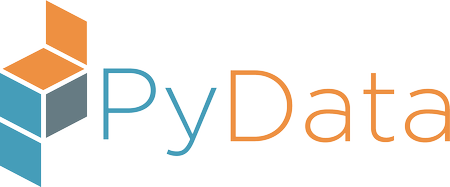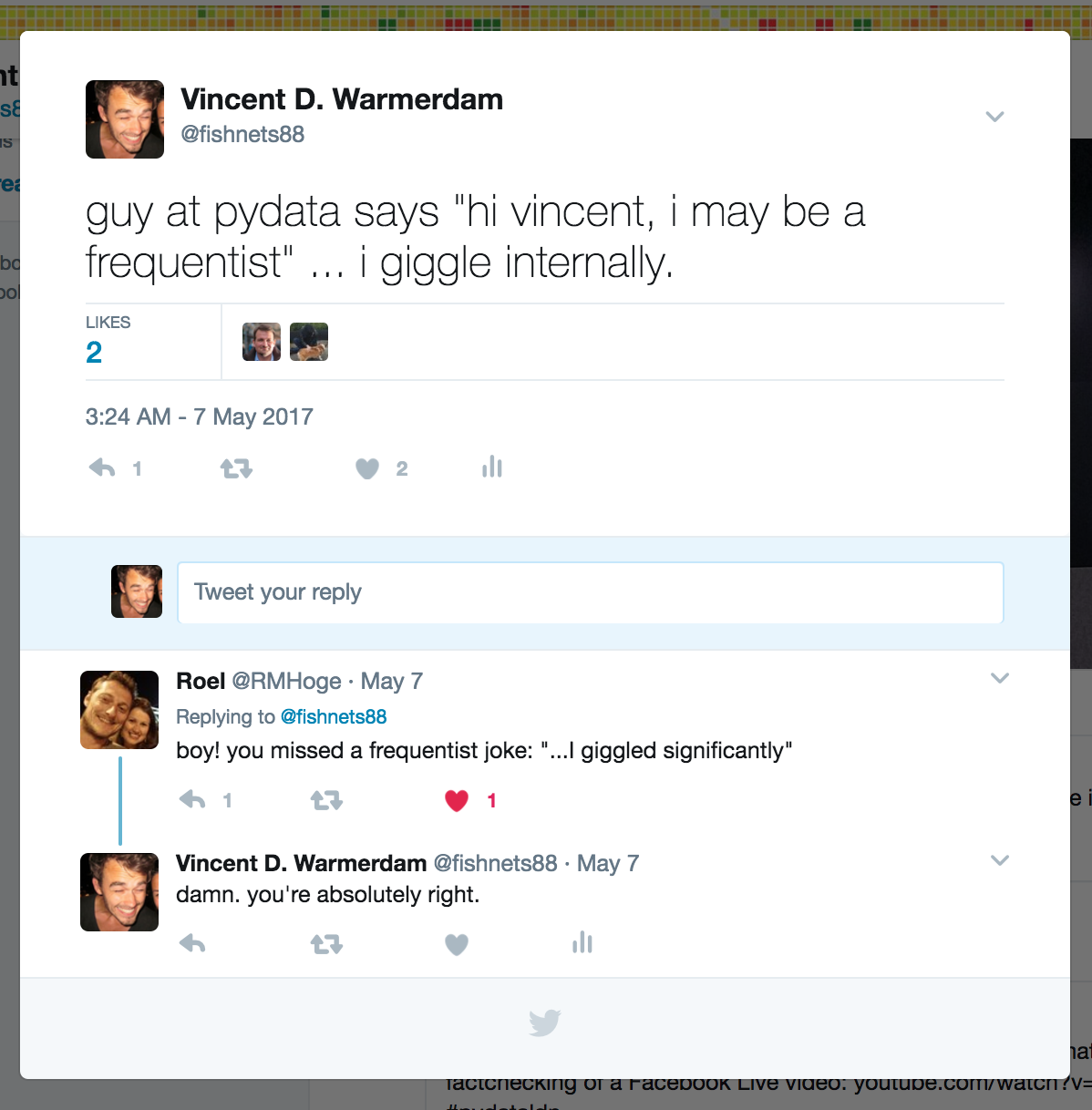This year I was the chair of PyData Amsterdam and I'd like to share some insights on what that was like. I have been in the commitee in the year before but being the chair feels hugely different. There is more stress because of the extra responsibilities but I gained an experience and an overview that I simply didn't have previous year.

I'll just list all of my observations. I hope it may be of use to future organisers of similar events as well as a peek into the philosophy of the conference.
Numbers
PyData Amsterdam 2017 was the second big event for us. We had about 330 attendees. We did not sell out and we did not oversell. It is a healthy number of attendees for a returning event. We wouldn't want to become any bigger. This is partly because it introduces much more stress on the committee but also because this might make the conference less personal.
Keynotes
For keynotes we did our best to squeeze talks about ethics in. We live in a world where we are making lots of money with data and we felt it appropriate to also let people speak about all the good you could also be doing with it. We are projecting our opinion a bit by doing so. It may very well be that certain attendees prefer to get a lead comitter of tensorflow [such a speaker would probably boost tickets sales too]. This year we consiously decided it would be best to forgo such speakers in favor of those who may inspire others to make the world a bit better.
I was super psyched with the keynote speakers by the way. @Dirk, @Katharine, if you're ever around know that I still owe you guys infinite beers.
Speakers
Picking talks is still tricky but once you're doing the conference a second time you'll notice that it is easier to get proposals. We still asked people from our own private circles if they wanted to speak. In part we do this because we know these people and trust that they will give great talks but we also do it to boost ticket sales early. A scary truth of organising a conference is that most people typically buy their ticket in the two weeks leading to the event and announcing speakers early is the only boost we can give while the CFP is still in place.
Last year spark was all the hype, this year it was deep learning. We did our best to ensure we had an offering of these technologies but we did our best to also prevent the hype from taking over. My personal belief focus is to get speakers who end up talking about the "joy of python and data". We had a few great examples;
- We had a keynote who was using python to train drones to find endangered species of orangutang in the rainforests of Borneo [insert randomforest joke here]
- We had a guy give a talk about "Risk Analysis" [he built a bot to play the risk boardgame, the title was meant to poke at the finance consultants]
- We had a guy give a talk about how "Metal" certain words were [turns out that 'co-operation' is the least metal word]
- We had a guy who did a talk on how to simulate languages phonetically [to fool the google translate engine]
Not only are all these talks relatively easy to understand but they also end up being very memorable. If it were up to me we would only have these talks but the simple reality is that these talks usually aren't too practical. Lots of people come to PyData to learn new skills which means that we also need some of the hype talks to be there. It seems like we have striked a cool balance although I would say this edition wasn't too beginner friendly. If you are a new python user, you may have been intimidated a bit.
Training Day
We had a seperate training day on the friday before the conference. This was the first time we did this. We imagined that by doing so we'd be able to host more talks [less workshops] during the actual PyData conference. We also expected that there'd be less interest in the training than the actual conference because it is held on a Friday. We figured that people needed to go to work or go to class on that day.
We were kind of wrong. We totally sold out on the 70-something tickets we had and we had an inbox which was drowning in waiting list requests. The tutorial sessions were great, but we may want to find a way to host more people. One immediate idea for next year is to perhaps make the training day single track and accesible for beginners as well. This way we may fit more people in the space as well as make the conference more accesible for beginners. If the conference is advanced such a day may make it less intimidating for the beginning python developers.
Diversity
I've been to tech conference where women aren't treated particularily well. It's kind of grisly to see. I am happy to say that we have a conference where all people feel welcome and comfortable, no matter what background.
We seem to be doing allright in terms of diversity but not great. We have 10% female attendees but we only had three female speakers out of 37. We also had 10 slots for diversity tickets and we were able to allocate only 7 of them. We want to do better here and are welcome to any ideas. Do note that we did do the following;
- We reached out to Django Girls as well as PyLadies
- We used our own meetup group to make people aware of the diversity program
- The entire committe used linkedin and twitter to basically spam people
- We reached out to every college teacher we knew to let their students know
- People at NumFOCUS did all of these things too but on a global level
I'd love to hear ideas on what we could do better here. One idea for next year is to not only have 10 diversity tickets but to also have 10 youth tickets such that highschoolers also can also get free entry. We may be able inspire some people at a younger age.
Sponsors
Sponsors are really really really important. We were very happy to learn that PyData has never had as many sponsors as we had. This is important for two reasons.
- Sponsors make PyData a financial success. Without sponsors it would be a whole lot harder to organise these sort of things in a way that we have money left over for NumFOCUS.
- The fact that we have more sponsors who want to help out is a signal that the community is growing. The sponsors aren't just there to recruit, they are also there to learn and share knowledge. Optiver [a financial trader] gave an exellent technical talk in which they shared some of their stack and way of work. As a result of the conference, we're now also talking to them for meetups.
Vibe
Food at a conference is important. Booking.com and GoDataDriven seem to understand this perfectly. Quality was off-the-charts good. Even if you were vegan or vegetarian, the options were plenty. We learned this lesson last year and we simply repeated. Great food makes for great vibe.
The great talks also do this but I was very happy to see lot's of people hacking away with speakers. People were interacting, not just listening. We may want to encourage this a bit more next year.
If you went to the conference you may have noticed that I memorised a series of jokes to keep the audience entertained as speakers are setting up. These jokes weren't particularily good but it kept the audience in check while they were waiting and caused a 'people are entertained vibe'. I've even gotten personal emails from random attendees telling me how this made a difference to the vibe. Quotes like;
It's easy for a technical conference to be very staid but a bit of humour goes a long way. I think you really held the conference together.
I didn't fully realise how much of an effect the this caused to the vibe untiil the lightning talks. At some point I just told the audience that I ran out of jokes. When I did this, suddenly one of the devs from the Jupyter project jumped on stage to fill the void with a joke simply because he did not want the jokes to stop and encourage others to join in.
After-Math
The conference was a proper succes but we will need a bit of help next year. We're getting to a stable point with PyData Amsterdam but people from the current committee may want to focus on other parts of their life [some will start having their first child this year, others their 5th!]. We want to keep the ball rolling and would like to have some more members interested in joining the community. Come talk with us at the meetups or ping me on twitter.
With that message said. Let us keep the data science jokes comming.
